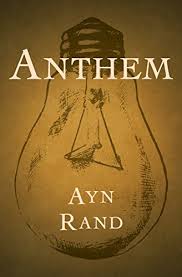Anthem Page #14
Anthem is a dystopian fiction novella by Russian-American writer Ayn Rand, written in 1937 and first published in 1938 in the United Kingdom. The story takes place at an unspecified future date when mankind has entered another Dark Age.
from us. This is our home and the end of our journey. This is your house, Golden One, and ours, and it belongs to no other men whatever as far as the earth may stretch. We shall not share it with others, as we share not our joy with them, nor our love, nor our hunger. So be it to the end of our days.” “Your will be done,” they said. Then we went out to gather wood for the great hearth of our home. We brought water from the stream which runs among the trees under our windows. We killed a mountain goat, and we brought its flesh to be cooked in a strange copper pot we found in a place of wonders, which must have been the cooking room of the house. We did this work alone, for no words of ours could take the Golden One away from the big glass which is not glass. They stood before it and they looked and looked upon their own body. When the sun sank beyond the mountains, the Golden One fell asleep on the floor, amidst jewels, and bottles of crystal, and flowers of silk. We lifted the Golden One in our arms and we carried them to a bed, their head falling softly upon our shoulder. Then we lit a candle, and we brought paper from the room of the manuscripts, and we sat by the window, for we knew that we could not sleep tonight. And now we look upon the earth and sky. This spread of naked rock and peaks and moonlight is like a world ready to be born, a world that waits. It seems to us it asks a sign from us, a spark, a first commandment. We cannot know what word we are to give, nor what great deed this earth expects to witness. We know it waits. It seems to say it has great gifts to lay before us, but it wishes a greater gift for us. We are to speak. We are to give its goal, its highest meaning to all this glowing space of rock and sky. We look ahead, we beg our heart for guidance in answering this call no voice has spoken, yet we have heard. We look upon our hands. We see the dust of centuries, the dust which hid the great secrets and perhaps great evils. And yet it stirs no fear within our heart, but only silent reverence and pity. May knowledge come to us! What is the secret our heart has understood and yet will not reveal to us, although it seems to beat as if it were endeavoring to tell it? PART ELEVEN I am. I think. I will. My hands... My spirit... My sky... My forest... This earth of mine.... What must I say besides? These are the words. This is the answer. I stand here on the summit of the mountain. I lift my head and I spread my arms. This, my body and spirit, this is the end of the quest. I wished to know the meaning of things. I am the meaning. I wished to find a warrant for being. I need no warrant for being, and no word of sanction upon my being. I am the warrant and the sanction. It is my eyes which see, and the sight of my eyes grants beauty to the earth. It is my ears which hear, and the hearing of my ears gives its song to the world. It is my mind which thinks, and the judgement of my mind is the only searchlight that can find the truth. It is my will which chooses, and the choice of my will is the only edict I must respect. Many words have been granted me, and some are wise, and some are false, but only three are holy: “I will it!” Whatever road I take, the guiding star is within me; the guiding star and the loadstone which point the way. They point in but one direction. They point to me. I know not if this earth on which I stand is the core of the universe or if it is but a speck of dust lost in eternity. I know not and I care not. For I know what happiness is possible to me on earth. And my happiness needs no higher aim to vindicate it. My happiness is not the means to any end. It is the end. It is its own goal. It is its own purpose. Neither am I the means to any end others may wish to accomplish. I am not a tool for their use. I am not a servant of their needs. I am not a bandage for their wounds. I am not a sacrifice on their altars. I am a man. This miracle of me is mine to own and keep, and mine to guard, and mine to use, and mine to kneel before! I do not surrender my treasures, nor do I share them. The fortune of my spirit is not to be blown into coins of brass and flung to the winds as alms for the poor of the spirit. I guard my treasures: my thought, my will, my freedom. And the greatest of these is freedom. I owe nothing to my brothers, nor do I gather debts from them. I ask none to live for me, nor do I live for any others. I covet no man’s soul, nor is my soul theirs to covet. I am neither foe nor friend to my brothers, but such as each of them shall deserve of me. And to earn my love, my brothers must do more than to have been born. I do not grant my love without reason, nor to any chance passer-by who may wish to claim it. I honor men with my love. But honor is a thing to be earned. I shall choose friends among men, but neither slaves nor masters. And I shall choose only such as please me, and them I shall love and respect, but neither command nor obey. And we shall join our hands when we wish, or walk alone when we so desire. For in the temple of his spirit, each man is alone. Let each man keep his temple untouched and undefiled. Then let him join hands with others if he wishes, but only beyond his holy threshold. For the word “We” must never be spoken, save by one’s choice and as a second thought. This word must never be placed first within man’s soul, else it becomes a monster, the root of all the evils on earth, the root of man’s torture by men, and of an unspeakable lie. The word “We” is as lime poured over men, which sets and hardens to stone, and crushes all beneath it, and that which is white and that which is black are lost equally in the grey of it. It is the word by which the depraved steal the virtue of the good, by which the weak steal the might of the strong, by which the fools steal the wisdom of the sages. What is my joy if all hands, even the unclean, can reach into it? What is my wisdom, if even the fools can dictate to me? What is my freedom, if all creatures, even the botched and the impotent, are my masters? What is my life, if I am but to bow, to agree and to obey? But I am done with this creed of corruption. I am done with the monster of “We,” the word of serfdom, of plunder, of misery, falsehood and shame.
Translation
Translate and read this book in other languages:
Select another language:
- - Select -
- 简体中文 (Chinese - Simplified)
- 繁體中文 (Chinese - Traditional)
- Español (Spanish)
- Esperanto (Esperanto)
- 日本語 (Japanese)
- Português (Portuguese)
- Deutsch (German)
- العربية (Arabic)
- Français (French)
- Русский (Russian)
- ಕನ್ನಡ (Kannada)
- 한국어 (Korean)
- עברית (Hebrew)
- Gaeilge (Irish)
- Українська (Ukrainian)
- اردو (Urdu)
- Magyar (Hungarian)
- मानक हिन्दी (Hindi)
- Indonesia (Indonesian)
- Italiano (Italian)
- தமிழ் (Tamil)
- Türkçe (Turkish)
- తెలుగు (Telugu)
- ภาษาไทย (Thai)
- Tiếng Việt (Vietnamese)
- Čeština (Czech)
- Polski (Polish)
- Bahasa Indonesia (Indonesian)
- Românește (Romanian)
- Nederlands (Dutch)
- Ελληνικά (Greek)
- Latinum (Latin)
- Svenska (Swedish)
- Dansk (Danish)
- Suomi (Finnish)
- فارسی (Persian)
- ייִדיש (Yiddish)
- հայերեն (Armenian)
- Norsk (Norwegian)
- English (English)
Citation
Use the citation below to add this book to your bibliography:
Style:MLAChicagoAPA
"Anthem Books." Literature.com. STANDS4 LLC, 2025. Web. 8 Mar. 2025. <https://www.literature.com/book/anthem_329>.








Discuss this Anthem book with the community:
Report Comment
We're doing our best to make sure our content is useful, accurate and safe.
If by any chance you spot an inappropriate comment while navigating through our website please use this form to let us know, and we'll take care of it shortly.
Attachment
You need to be logged in to favorite.
Log In